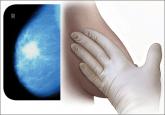News
Is supplemental ultrasonography a valuable addition to breast cancer screening for women with dense breasts?
The benefit is small and the cost is high, according to this comparative modeling study.
Andrew M. Kaunitz, MD, and Laila Samiian, MD
Dr. Kaunitz is University of Florida Research Foundation Professor and Associate Chairman, Department of Obstetrics and Gynecology, at the University of Florida College of Medicine–Jacksonville. Dr. Kaunitz serves on the OBG Management Board of Editors.
Dr. Samiian is Assistant Professor and Chief, Section of Breast Surgery, at University of Florida College of Medicine–Jacksonville. Dr. Samiian serves as the Director of the UF Health Jacksonville Multidisciplinary Breast Conference.
The authors report no financial relationships relevant to this article.
Most women will not develop breast malignancy
As Hartmann and colleagues point out, all is not dire once a woman is diagnosed with atypical hyperplasia of the breast. In most of these women, breast cancer will not develop—and if it does develop, it may occur at an age when mortality from other causes is more likely than from breast cancer. In this respect, women with atypical hyperplasia of the breast are different from carriers of BRCA mutations. Although women with atypical hyperplasia as well as mutation carriers are both at high lifetime risk for breast cancer, breast malignancies occur at an earlier age in mutation carriers. Accordingly, as the authors of this special report advise, in general, a diagnosis of atypical hyperplasia should not be considered an indication for risk-reducing bilateral mastectomy.
Share your thoughts on this article! Send your Letter to the Editor to rbarbieri@frontlinemedcom.com. Please include your name and the city and state in which you practice.
The benefit is small and the cost is high, according to this comparative modeling study.

A Canadian study has left some clinicians uncertain about when to recommend mammography—and to whom. Here, four experts in breast cancer screening...
I support individual preferences regarding screening for average-risk women in their 40s
Most deaths from breast cancer occur in women who are unscreened, according to this review of medical records and death data from two large...
Yes. Women with first-degree relatives with breast and prostate cancer had a 78% elevated risk for developing breast cancer (adjusted hazard ratio...

